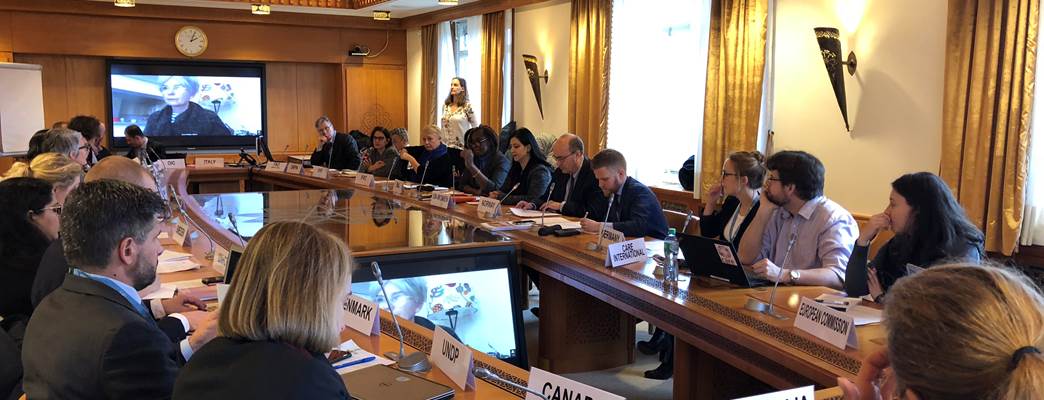The meeting brought together states, international organisations and civil society organisations for a constructive dialogue on how to address accountability in humanitarian action, focusing on gender dimensions. The roundtable was organised as part of UN Women's dialogue series Changing the Conversation: Investing in Gender Equality, A Rights and Effectiveness Issue.
Ambassador Hans Brattskar opened the meeting, which was chaired by Ms. Hiba Qasas, Chief of Crisis Prevention, Preparedness and Response at UN Women Geneva. Qasas pointed out how structural inequalities lead to differential vulnerabilities. As a result, women often have a higher exposure to risk, which becomes even worse in humanitarian crisis situations. Still, only a quarter of response plans from 2017 included the gender dimension. Despite increased incorporation of gender considerations across humanitarian action there is still a long way to go, Qasas pointed out.
The meeting included discussion on the Inter-Agency Standing Committee’s (IASC) newly adopted Policy on Gender Equality and the Empowerment of Women and Girls in Humanitarian Action. IASC is the primary mechanism for inter-agency coordination of humanitarian assistance. Brattskar noted how Norway is particularly pleased that the gender policy is accompanied by an Accountability Framework, which outlines what the different parts of the humanitarian system is expected to do in order to implement the policy. “We all have a responsibility to ensure that this Accountability Framework leads to actual accountability,” added Brattskar.
Brattskar emphasised the importance of gender equality and women’s empowerment for Norway, both at home and in humanitarian response; “In Norway’s experience, it is also smart economics. We know that investment in gender equality accelerated development and economic growth.” Brattskar also highlighted how Norway each year reports on efforts to implement our National Action Plan on Women, Peace and Security (2015-2018).
It was pointed out several times during the discussion that the needs of women, men, girls and boys differ and that this must be reflected in humanitarian action. “Unless our humanitarian response is gender-responsive, we are ignoring key challenges,” said Brattskar. To this end, contributing to the Gender Standby Capacity Project (GenCap) was highlighted by several participants. GenCap is an international stand-by force that provides experts on women’s rights and gender equality to strengthen the gender perspective in humanitarian operations. It is an initiative established as a collaboration between IASC and the Norwegian Refugee Council (NRC).
Other measures highlighted by participants to ensure the integration of gender dimensions in humanitarian action included requiring inclusion of gender perspectives in funding applications and narrative reports, following up on such requirements, asking for lessons learned in gender-responsive humanitarian programming, and supporting initiatives to improve the protection of women against sexual and gender-based violence through civil society, regional organisations and the UN. Another important articulated step was to mobilise and engage with women in order to identify areas where humanitarian response is gender blind.
